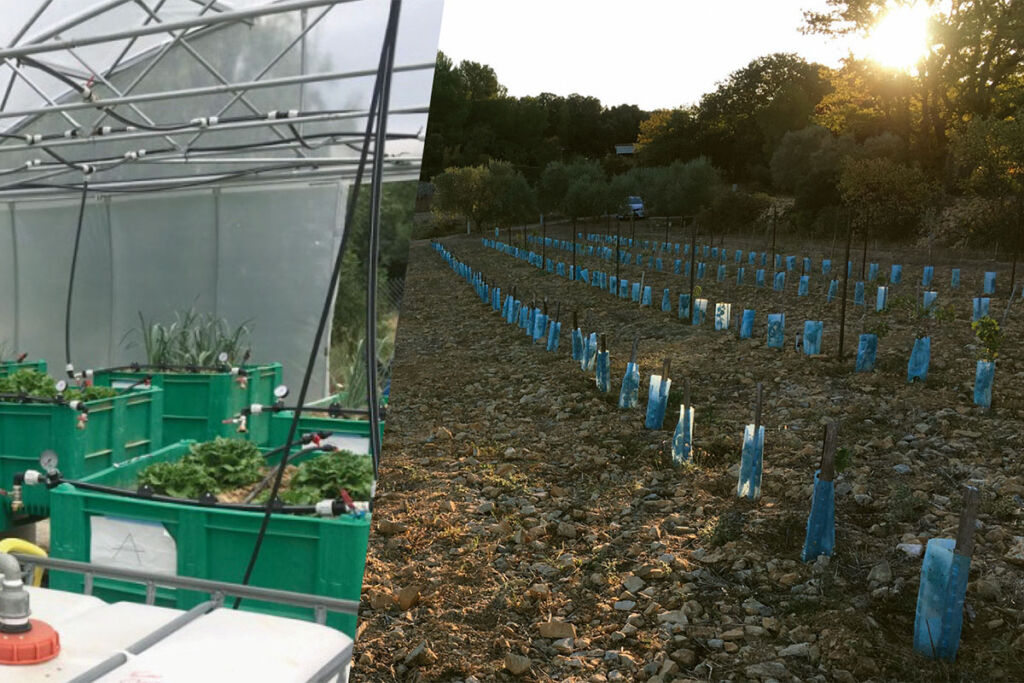[LUM#16] Savings in small amounts
Irrigating crops with wastewater? Installing connected water meters for farmers? These are some of the avenues researchers are exploring to preserve water resources, of which the agricultural sector is a major consumer.

Turning off the tap while brushing your teeth. Limiting the time spent in the shower. These are everyday actions that help reduce our water consumption. While these are positive steps, they are clearly insufficient on a global scale, especially when we consider that 50% of the water consumed in France is used by the agricultural sector. This figure rises to 70% on a global scale.
"This is a major challenge because irrigation needs are increasing with global warming, particularly further north, where certain crops that previously did not require watering now need to be irrigated," explains Nassim Ait-Mouheb*. Everywhere, the need for irrigation is being felt earlier in the year, and it is affecting more and more crops. "This is particularly the case for vines, which can now be irrigated in France," says the researcher, who specializes in fluid mechanics and process engineering applied to irrigation techniques.
And it is precisely an ingenious process that he is implementing to help reduce pressure on this precious resource: the reuse of treated wastewater, more commonly referred to by the Anglicism "reuse." The idea is simple: use non-potable wastewater from treatment plants to irrigate crops in order to reserve good-quality water for consumption. "A solution to avoid conflicts of use in certain cases where resources may be limited."
Full-scale laboratory
While the alternative is appealing, its implementation represents a real challenge that researchers at the G-EAU laboratory are tackling. Technological challenges, agronomic considerations, health issues, social acceptance... the reuse of wastewater for agriculture raises many questions.
To answer this question, Nassim Ait-Mouheb has a full-scale laboratory at his disposal. A small plot of vines, olive trees, and fruit trees nestled in Murviel-Lès-Montpellier, which houses an experimental platform for reusing treated wastewater in drip irrigation. "A system of pipes running along the ground with drippers is an increasingly popular technique that can save water, provided it is implemented correctly and its effectiveness and durability are ensured, in particular by avoiding the risk of clogging by biofilms." In other words, the risk that all these devices could become clogged by clusters of bacteria or other microorganisms that inhabit wastewater...
Thanks to this platform, which is unique in France and was created in 2017, researchers can test the effects of this type of irrigation in real-life conditions: "We have an agricultural plot and an experimental field with above-ground tanks where we can irrigate crops either with wastewater that has not passed through the treatment plant or with clean water," explains Nassim Ait-Mouheb. The aim is to observe the effects of water quality on crops, from both an agronomic and a health perspective.
Downsides
From an agronomic perspective, the results are quite promising: "We are achieving good yields thanks to nutrients such as nitrogen, phosphorus, and potassium, which are naturally found in wastewater, " explains the specialist. From a health perspective, researchers are scrutinizing lettuce and leeks for traces of antibiotics, Escherichia coli, and enterococci. "Pathogen indicators are a key focus of our studies," says Nassim Ait-Mouheb. Another parameter to consider is the effects of wastewater irrigation on soil, "which can be problematic due to its salinity, which may ultimately alter soil quality." "Reusing wastewater is an interesting way to reduce water consumption in the agricultural sector, but there are many caveats to consider before moving from theory to practice." In Murviel-les Montpellier, these caveats are being tackled head-on to make reuse a solution for the future. Currently in France, less than 5% of treated wastewater is reused, and for very limited purposes.
Irrigation 2.0
To reduce their water consumption, some farmers have adopted smart meters. What makes them special? They allow farmers to monitor their water usage in real time, enabling them to better manage their irrigation and facilitate water sharing across a common network. Another benefit is that these meters provide managers with frequent and accurate consumption measurements. This data is invaluable for regulating hydraulic structures and optimizing water releases from reservoirs. "For this system to be effective, a sufficient number of farmers need to opt for it," explains Raphaële Préget. "But today, only a minority of farmers are equipped with it."
How can we encourage them to adopt smart meters? This is the question posed by researchers at CEE-M**(Montpellier Center for Environmental Economics) as part of the C4EAU project. "We surveyed 1, 272 farmers to test different incentive mechanisms." Among the instruments tested and approved was a conditional subsidy "that would be paid to farmers if and only if a certain number of them adopted smart meters. It's a way of creating a collective dynamic for change by playing on social norms, " explains Raphaële Préget.
As part of these behavioral economics approaches, researchers also tested various "nudges," or small pushes, or "non-monetary incentives that aim to guide choices without constraining them, " explains the researcher. An example of a nudge? "We shared with them the testimony of a well-equipped farmer who praised the benefits of smart meters. " These are effective incentives for greater cooperation, which is essential for managing a shared resource.
See also:
* G-EAU (CIRAD – AgroParisTech – IRD – INRAE – Institut Agro)
** CEE-M ((UM – CNRS – INRAE – Institut Agro)
Find UM podcasts now available on your favorite platform (Spotify, Deezer, Apple Podcasts, Amazon Music, etc.).